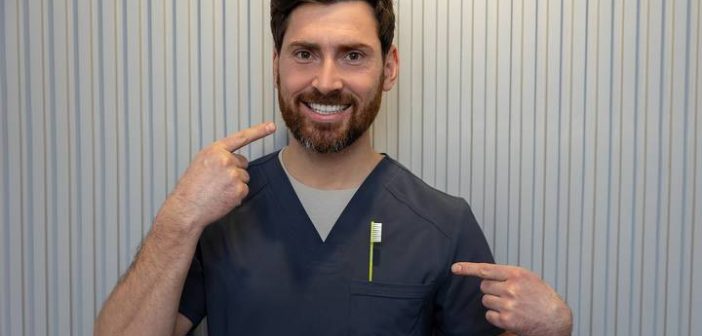Do you have what it takes to be a dentist? This career path is not for everyone, but it can be extremely fulfilling for those with the right skills.
After all, it takes much more than great manual dexterity to work as a dentist. You also need different interpersonal skills that will make it easier for you to collaborate with your colleagues and put your patients at ease.
Since many children and adults fear dental procedures, you must be friendly and compassionate.
Here are ten skills required to be a dentist to figure out if this would be a good career choice for you.
1. Dexterity
Above all, a dentist needs superior manual dexterity. Great hand-eye coordination is essential as well.
Every day, dentists must perform high-precision tasks in a really small space: the mouth of their patients. Whether drilling a hole in a tooth or fitting a filling, they simply can’t afford to make mistakes.
2. Attention to detail
A dentist needs meticulous attention to detail, manual dexterity and hand-eye coordination.
This is required for them to be able to spot cavities in their patient’s teeth or to assess different oral issues.
Great attention to detail is also important when it comes to adjusting the shape, size, and alignment of a patient’s teeth and giving them a smile they will be happy with.
3. Ability to focus
Manual skill and attention to detail are not enough to make you a successful dentist if you cannot focus on what you’re doing.
To perform their work while ensuring the safety and comfort of their patients, dentists need a strong ability to focus and maintain their focus.
They simply can’t get distracted while holding a dental drill in a patient’s mouth.
4. Problem-solving skills
A dentist needs to be able to think on their feet, especially when facing a patient who has a dental emergency.
Problem-solving skills are important to be a good dentist. They have to be able to rely on their judgment to make quick decisions that will solve their patients’ problems.
These skills are also useful to dentists who run their businesses and manage their employees.
5. Adaptability
Dentists learn a lot in dental school. However, over time, dental treatments have evolved. Dental supplies and tools change, and new techniques and equipment are developed.
To stay relevant, a dentist needs to be able to adapt to changes. They must be willing to learn how to perform new treatments while using the latest tools and supplies. They need to understand the latest catalogues from dental supply companies.
Adaptability will allow them to refine their skills and increase their knowledge long after they graduate from dental school to become qualified dentists.
6. Great communication skills
Communication skills are essential for the interpersonal skills required to be a dentist.
Sure, a dentist spends much time looking inside their patients’ mouths. But they also need to speak with their patients, as well as with their assistants and other colleagues.
Therefore, they must be able to interact with other people, answer their questions, and communicate clearly whenever they have to explain something to them.
7. Ability to connect with patients
As they interact with their patients, dentists need to be able to connect with them. If a dentist can show each of their patients that they care about them and that they are enthusiastic about providing them with the treatments they need, they will be more likely to earn their trust.
Dentists also need to be able to explain why a patient needs a major dental procedure, and they have to be able to do it in a friendly and reassuring manner.
8. Compassion
A dentist should always be compassionate towards their patients. This is even more important when they treat someone terrified of dental procedures.
By understanding that their patient’s needs come first and being transparent and compassionate, a dentist can earn the trust of those needing them.
9. Ability to work under pressure
A dentist needs to have a calm demeanour. Patients will simply not be at ease if their dentist appears nervous or agitated.
On top of being a soothing presence, a dentist must work well under pressure. Whenever they have to perform an extremely difficult procedure, they are running behind schedule, or they have to deal with a demanding patient, they need to be able to keep their composure.
10. Leadership
Finally, a dentist should have great leadership skills, especially if they run their dental office. Their employees and colleagues will look up to them, and they need to be able to make decisions and motivate everyone to do the best work they can.




